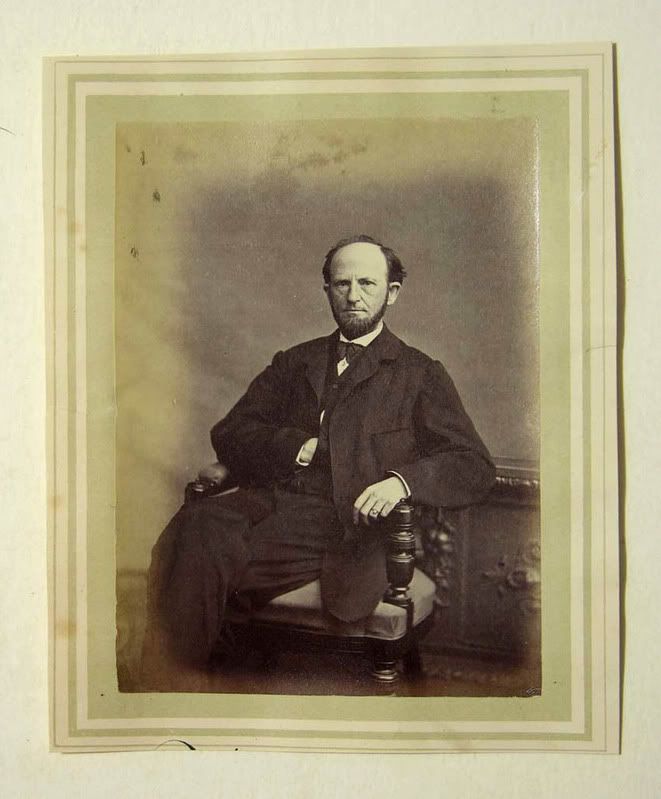
Jones was born on Febuary 17, 1823 in Conneaut, Ohio. Once his father died, at J. Russell's age of two, the family moved on to Pecatonica, Illinois, up from the Rock River when his mother remarried.
"Taking companionship of Judge Fleming of Rockford and Colonel Broadhead, J. Russell traveled by wagon to see his family before setting out for adventure in Galena. Taking the loan of an old white horse from his cousin, selling some coon skins, he rode. Upon arrival buying a hat with his only remaining dollar. A large merchantile establishment owned by Benjamin H. Campbell finally offered him a means of support. WIth readiness to take on all tasks, made for a grand impression. In a few short years, he became the mainstay of the business. By 1846, at just 23 years of age, he was elected to the position of Secretary and Treasurer of the Galena and Minnesota Packet Line. This fine steamboat company operated "down the Galena River (then still known as the Fever River) the few miles to the Mississippi, and up that great artery of trade to Dubuque, Minneapolis and St. Paul, the Line's northern terminus. It also had connections to St. Louis and the South."
By 1857, married with family, he moved them into a "big Victorian mansion, styled in the fashionable manner of an Italian villa, which he had just built on the east side of the River, now known as 'Belvedere'." Later, after some misfortune, the home itself would acquire the name.
In 1860, his election to the legislature from JoDaviess and Carroll Counties sent him to Springfield and at the tender age of 37, he became the Honorable J. Russell Jones. Becoming tight friends with a Captain Grant, a West Point graduate and once a hero of the Mexican War who had fallen into hard times and had retreated to his father's business in Galena. Undetered, J. Russell saw the potential in this man and enlisted Grant to train the townsmen in the "rudiments of military tactics and discipline" as the country entered its darkest days. Jones was appointed by President Lincoln himself to the office of United States Marshals for the Northern District of Illinois just three weeks before the war broke out.
The likes of friendships with Washburne, Grant and Lincoln did not come without consequence. In the course of his duties, J. Russell seized upon two Galena lawyers (and neighbors) who saw opposition to Lincoln's stand. J. Russell, after open hostility of these two "copperheads," received orders from Secretary of War Stanton to arrest them. Jones acted. Johnson and Sheean were arrested, detained and eventually transferred to Fort Delaware (This will be discussed in a later post). The case eventually was dropped which set to motion a course of litigation against Washburne, Jones and others that lasted years. The sorry consequence after five years of upper court hearings for suit of wrongful imprisonment, eventually awarded damages to the defendants. In the course of all of the proceedings and final judgement of Johnson vs Jones, "Johnson succeeded to the ownership of the Jones mansion in Galena. Known through the years as the Jones House, then the (Henry) Corwith House, and then the Johnson House.
By 1863 J. Russell had gained control of the Chicago West Division Rail Company. He returned a favor to his once mentor, Benjamin Campbell and made him Vice President of his companies. His company grew and remained in tack through the devistation of the Chicago fire with minimal loses. At a value of nearly $6 million dollars in 1886, the company was sold with rewards to investors who believed in its sale.
In the days of Lincoln's presidency, Jones received a telegram from President Lincoln asking that J. Russell pay him a visit in Washington to enlist his advice about the stirrings of Grant's supporters for Grant to run for President two years hence. Lincoln wanted to know more about Grant, being aware that the warrants of impeachment might prevent Lincoln from serving a second term. However, the assassination brought speculation to a halt. "As early as 1866, Jones and Washburne apparently had been among those who promoted the name of Ulyesses S. Grant for President..."
Grant was awarded the Republican nomination and election. Jones "stood at the pinnacle of his career." Washburne would become Secretary of State. J. Russell Jones was named Minister Resident of Belgium as a foreign minister of the diplomatic service. In 1869, at the age of 64, Jones took his post and residence with his family in Brussels.
"Up off the sidewalk of Michigan Avenue" he died on April 11, 1909."
The italicized portion of this blog is from a very informative page on the Belvedire Mansion's website dedicated to the home's original owner.
No comments:
Post a Comment